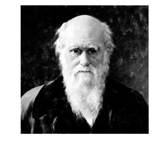Do you suppose Darwin, one of the greatest scientists of all time, really did foolish experiments? Or did he do experiments that were so simple and basic that other people just thought they were foolish?

Sometimes, people think they already know the answer to a question or the solution to a problem. Sometimes, they really do know an answer or a solution, but without thinking they are important.
Charles Darwin didn’t settle for(满足于)just thinking he knew something. And, he believed all things could be important however simple they seemed to be.
Suppose you drop sheets of paper that are of exactly the same size and shape. If you drop them at the same time in the same place, they will fall in the same way. Now make one of the sheets of paper into a tight little ball and let it drop along with the other sheets. What happens? You have done an experiment that is so simple that you might think it couldn’t be worth anything.
But this simple experiment is important. It explains part of our present-day understandings of physics, ideas that were worked out long ago by Galileo and Newton. And these understandings
set aside some of ancient Greek physics.
Scientists sometimes stop to look at very simple things and to think very hard about them. Even the simplest idea, which we might think is foolish, can shake the foundations of science.
小题1: The passage tells us that Charles Darwin
.
| A.was a great English scientist |
| B.always liked doing the experiments that others thought difficult |
| C.thought even the simplest thing was important |
| D.didn’t get well with others |
小题2: The underlined phrase “set aside” most probably means
.
| A.throw away | B.store up |
| C.put to use | D.realize |
小题3: The author of the passage tries to
.
| A.convince us that Charles Darwin, Galileo and Newton are the greatest scientists in the world |
| B.draw the conclusion that basic sciences are simple things |
| C.prove that two sheets of paper, with the same size and shape, will fall at the same speed |
| D.draw our attention to everyday happenings around us |
小题4:Which of the following is TRUE?
| A.Darwin really did foolish experiments. |
| B.According to some people Darwin did foolish experiments. |
| C.It is believed by all the people that things could be important though they seemed to be simple. |
| D.Galileo and Newton worked out ancient Greek physics. |